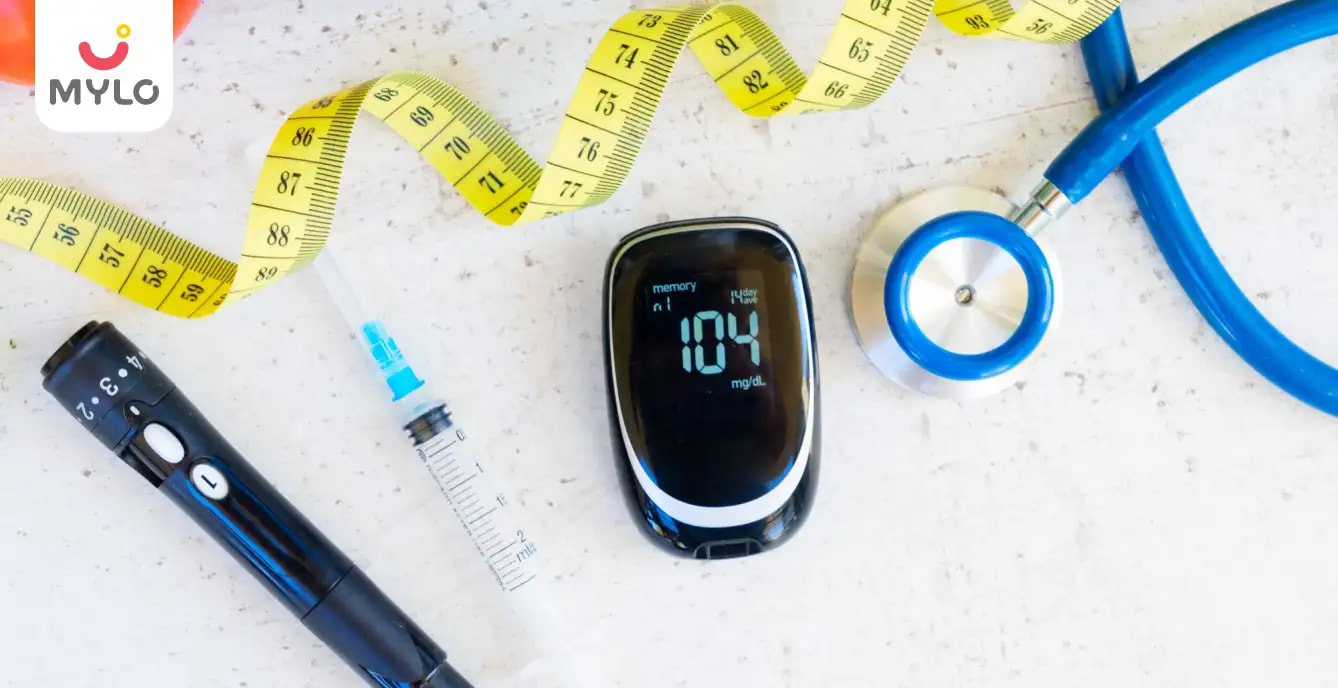Home

Top 7 Diet Tips to Control Your Sugar Levels During Pregnancy
In this Article

Pregnancy
Top 7 Diet Tips to Control Your Sugar Levels During Pregnancy
Updated on 17 November 2022



Medically Reviewed by
Aanchal Aggarwal
Postpartum nutrition Weight Loss Nutrition during pregnancy PCOD - M.Sc in therapeutic nutrition| Certified Diabetes Educator
View Profile

During pregnancy, the body becomes resistant to insulin hormone which interferes with proper glucose metabolism leading to diabetes during pregnancy also called gestational diabetes. Insulin hormone is responsible for proper glucose utilization in the blood post meals and throughout the day. But insulin resistance does not affect blood glucose levels in women who have strong pancreas since it is still able to produce enough insulin to counter-regulate the effects of insulin resistance.
In case the pancreas is not able to produce enough insulin to take care of the extra needs of pregnancy, gestational diabetes happens. In other cases, women already have diabetes when they conceive.
The extra glucose in your body can lead to a macrosomic baby which may cause difficult labour, stress to the baby, increase the risk of the baby getting diabetes at a later stage in life, and cause extremely low sugar in the baby immediately after birth.
Diabetes during pregnancy comes with its own set of challenges but can be managed if proper medical and lifestyle measures are taken. Other than appropriate medication, dietary management is the key step that the doctor advises in this case.
So, control what you eat but do not diet since you and your baby need extra calories to make up for the growing needs.
7 Diet Tips to Control Sugar Levels During Pregnancy
Here are some basic dietary tips that you can follow to manage diabetes during pregnancy and keep your sugar levels under control:
1. Say yes to complex carbohydrates
Choose complex carbohydrates like fruits and vegetables with edible peel, salad before meals, whole pulses and grains like rajma, chole, kala chana, sprouts, bajra, dalia, whole wheat bread, roti with bran etc. The high fiber content in complex carbohydrates helps in controlling blood sugar levels. Almost 50% of the calories of your day's total energy requirement should come from complex carbohydrates.
2. Small, frequent meals are the way to go
Instead of eating three big meals in the day, you should try to have small frequent meals to maintain healthy sugar levels. Large food portions may lead to high sugar levels. Small meals are especially beneficial to control post-meal sugars if properly spaced with a minimum 2-hour gap. All you need to do is distribute your meal in small amounts throughout the day.
3. Proteins are your friends
Protein does not increase your blood sugar levels immediately. Only 60% of protein gets converted to glucose in the next 4 hours which gives your body enough time to utilize excess glucose in the blood. Almost 20-25% of the calories of your day’s energy should come from proteins. Proteins from eggs, freshwater fish, nuts, whole pulses, lean meat, pasteurized milk and milk products are good options. Include protein-rich snacks in the mid-morning and evening time.
4. The curious case of fats
High-fat foods like pizza and fried foods are good to taste but bad for your blood sugar levels and weight. They may contribute to further insulin resistance. High fat does not increase blood sugar levels immediately after consumption but over a period of 6-10 hours. Though almost 25-30% of the day’s calories should come from fat but make sure the fat is healthy. You may consume extra virgin olive oil in salads, almonds, walnuts, sunflower seeds, chia seeds, flax seeds, or a combination of mustard oil, ghee, and vegetable oils.
5. Cure your sweet tooth
Since the level of sugar in the blood is high, the best is to avoid it from the outside. Sugar in any form- jaggery, honey, castor sugar, brown sugar etc. is only going to further increase your blood sugar levels. If you have sugar cravings, the best is to take fruit custard without sugar (the natural sweetness of fruits makes it taste amazing), apple or carrot kheer, 1-2 figs or 1-2 dates etc.
7. Say yes to fitness
Staying physically active is of utmost importance with gestational diabetes since exercise helps in glucose utilization. A normal 30-minute walk is a safe exercise you can do regularly during pregnancy. You can also engage in a moderate workout and do pregnancy-safe exercises if your doctor allows.
To know more, Consult a dietician!





Medically Reviewed by
Aanchal Aggarwal
Postpartum nutrition Weight Loss Nutrition during pregnancy PCOD - M.Sc in therapeutic nutrition| Certified Diabetes Educator
View Profile


Written by
Ravish Goyal
Official account of Mylo Editor
Read MoreGet baby's diet chart, and growth tips

Related Articles
Related Topics
RECENTLY PUBLISHED ARTICLES
our most recent articles

TV & OTT
Best Action Movies On Amazon Prime

Pregnancy
How can a pregnant woman get 6000?

Prenatal Tests
What Are the Common Tests You Will Have During Your Pregnancy?

Vaginal Discharge
4 week pregnancy discharge
Celebrate Breast Feeding Week
Frequently asked questions about milk production

Maternity Leave
Is Maternity Leave 6 Or 9 Months?
- Top 5 Most Common Skin Care Myths Busted
- What are the Top Worries and Fears After Childbirth and How to Overcome Them
- Is It Really Essential for People to Wash Their Hands Before Holding a Newborn?
- Top 10 Hollywood Movies on Hotstar
- How Can You Easily Determine Using Seven Easy Homemade Remedies to Check if You’re Pregnant or Not?
- Best Crime Series On Amazon Prime
- Everything You Need to Know About Linea Nigra, the Line Around Your Belly
- Know Why Your Doctor May Change Your Due Date During Pregnancy
- 6 Ways to Protect Your Baby During Cold Season
- Are You Aware of These Warning Signs That You Should Be Careful of During Your First Trimester?
- Understanding Baby Sleep: 4-6 Months
- How to Take Care of Your Little One When He/She Is Arriving Early? What are Some Causes of Preterm Birth?
- When Should Parents Introduce Water to Their Little Ones? What Should Be the Accurate Quantity and How to Feed Your Baby?
- What to Do if My Toddler is Underweight?


AWARDS AND RECOGNITION

Mylo wins Forbes D2C Disruptor award

Mylo wins The Economic Times Promising Brands 2022
AS SEEN IN

- Mylo Care: Effective and science-backed personal care and wellness solutions for a joyful you.
- Mylo Baby: Science-backed, gentle and effective personal care & hygiene range for your little one.
- Mylo Community: Trusted and empathetic community of 10mn+ parents and experts.
Product Categories
baby carrier | baby soap | baby wipes | stretch marks cream | baby cream | baby shampoo | baby massage oil | baby hair oil | stretch marks oil | baby body wash | baby powder | baby lotion | diaper rash cream | newborn diapers | teether | baby kajal | baby diapers | cloth diapers |








